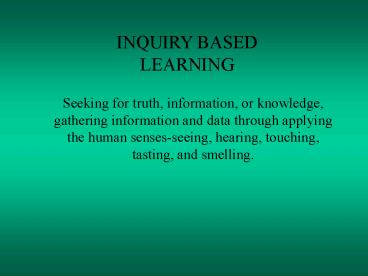INQUIRY BASED LEARNING PowerPoint PPT Presentation
1 / 18
Title: INQUIRY BASED LEARNING
1
INQUIRY BASED LEARNING
Seeking for truth, information, or knowledge,
gathering information and data through applying
the human senses-seeing, hearing, touching,
tasting, and smelling.
2
IMPORTANCE OF INQUIRY LEARNING
1. A Need or Want to Know 2. Seeking
Appropriate Resolutions to Questions and
Issues 3. Development of Inquiry Skills 4.
Nurturing of Attitudes 5. Transmitting Knowledge
3
This chart illustrates how human society and
individuals within society generate and transmit
the fund of knowledge.
4
EFFECTIVE INQUIRY LEARNING ELEMENTS
- Teachers see Patterns and Meanings Clearly
- Teachers have in-depth Knowledge of their Fields
- Teachers Knowledge is not just a Set of Facts
- Teachers can easily retrieve their Knowledge and
Learn New Information in their Fields with little
Effort (How People Learn, National Research
Council, 1999)
5
This figure illustrates the attributes necessary
for both generating and effectively transmitting
knowledge.
6
This chart illustrates that while knowledge is
increasing, so is the boundary of the unknown.
7
This chart illustrates that skills for processing
information are similar across all disciplines.
8
KEY PRINCIPLES
- Learning activities should focus on using
information processing skills. - Inquiry learning puts the student at the center
of an active learning process and teacher,
resources, and technology are prepared and
aligned to support the student. - The role of the teacher becomes the one of
facilitating the learning process. - Assessment focuses on the development of
information processing skills and conceptual
understandings rather than content.
9
CONTENT STANDARDS FOR SCIENCE
- Students should develop abilities necessary to do
scientific inquiry. - Students should develop understandings about
scientific inquiry. (Inquiry and the National
Science Education Standards)
10
ABILITIES NECESSARY TO DO SCIENTIFIC INQUIRY IN
GRADES 9-12
- Identify questions and concepts that guide
scientific investigations. - Design and conduct scientific investigations.
- Use technology and mathematics to improve
investigations and communications. - Formulate and revise scientific explanations and
models using logic and evidence. - Recognize and analyze alternative explanations
and models. - Communicate and defend a scientific argument.
(Inquiry and the National Science Standards)
11
SCIENCE TEACHING STANDARD A
- Teachers of a science plan an inquiry-based
science program for their students.
- Develop a framework of yearlong and short-term
goals for students. - Select science content and adapt and design
curricula to meet the interests, knowledge,
understanding, abilities, and experiences for
students. - Select teaching and assessment strategies that
support the students understanding. - Work together as colleagues within and across
disciplines and grade levels. (National Science
Education Standards)
12
SCIENCE TEACHING STANDARD B
B. Teachers of science guide and facilitate
learning.
- Focus and support inquiries while interacting
with students. - Orchestrate discourse among students about
scientific ideas. - Challenge students to accept and share
responsibility for their own learning. - Recognize and respond to student diversity and
encourage all students to participate. - Encourage and model the skills of scientific
inquiry.
13
SCIENCE TEACHING STANDARD C
C. Teachers of science engage in ongoing
assessment of their teaching and student learning.
- Use multiple methods to gather data about student
understanding and ability. - Analyze assessment data to guide teaching.
- Guide students in self-assessment.
- Use student data, observations of teaching, and
interactions with colleagues to report student
achievement.
14
SCIENCE TEACHING STANDARD D
D. Teachers design and manage learning
environments that provide students with the time,
space, and resources needed for learning science.
- Structure the time available so that all students
are able to participate. - Create a setting for student work that is
flexible and supportive of science inquiry. - Ensure a safe environment.
- Make the available science tools, materials,
media, and technological resources accessible to
all students. - Identify and use resources outside the school.
- Engage students in designing the classroom.
15
SCIENCE TEACHING STANDARD E
E.Teachers develop communities of science
learners that reflect scientific inquiry and the
attitudes and social values conductive to science
learning.
- Display and demand respect for the diverse ideas,
skills, and experiences of all students. - Enable students to have a significant voice in
decisions about the content and context of their
work. - Nurture collaboration among students.
- Structure and facilitate ongoing formal and
informal discussion based on a shared
understanding of rules of scientific disclosure. - Model the skills, attitudes, and values of
scientific inquiry.
16
SCIENCE TEACHING STANDARD F
F. Teachers actively participate in the ongoing
planning and development of the school science
program.
- Plan and develop the science program.
- Participate in decisions concerning the
allocation of time and other resources to the
science program. - Participate fully in planning and implementing
professional growth and development strategies
for themselves and their colleagues. (Inquiry and
the National Science Education Standards)
17
ESSENTIAL FEATURES OF CLASSROM INQUIRY
- Students are engaged by scientifically oriented
questions. - Students give priority to evidence, which allows
students to develop and evaluate explanations. - Students formulate explanations from evidence to
address scientific questions. - Students evaluate their explanations in light of
alternative explanations, particularly those
reflecting scientific understanding. - Students communicate and justify their proposed
explanations.
18
BLOOD SUGAR TESTING ACTIVITY

